|
|
|
Sort Order |
|
|
|
Items / Page
|
|
|
|
|
|
|
| Srl | Item |
| 1 |
ID:
113729
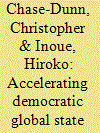

|
|
|
|
|
| Publication |
2012.
|
| Summary/Abstract |
This article discusses the evolution of the international system and global governance within the Europe-centred modern world-system since the 15th century in the context of a comparative framework that includes interpolity systems since the Stone Age. The evolution of the modern system includes the emergence of the European system of sovereign national states and colonial empires, the extension of the Westphalian system to the non-core by succeeding waves of decolonization, the rise and fall of successively larger hegemons, the deepening of global capitalism in waves of globalization, the emergence of weak international regulatory institutions and the prospects for and the rapid emergence of global democracy. It is not claimed that a global state has already emerged, but the authors see the long-term processes as the early stages of the emergence of a world state, and consider how these processes might be accelerated within the next few decades. The need for democratization of the institutions of global governance is also discussed. However, in this article, the focus is more on real geo-historical processes than normative questions, outlining the evolution of interpolity institutional orders, describing the challenges in thinking about global state formation, and discussing some of the technological and political forces that might accelerate the long-term trend toward global state formation.
|
|
|
|
|
|
|
|
|
|
|
|
|
|
|
|
| 2 |
ID:
196577


|
|
|
|
|
| Publication |
Switzerland, Springer, 2021.
|
| Description |
xxi, 305p.: figures, tableshbk
|
| Series |
Advances in African Economics, Social and Political Development
|
| Standard Number |
9783030773359
|
|
|
|
|
|
|
|
|
|
|
|
Copies: C:1/I:0,R:0,Q:0
Circulation
| Accession# | Call# | Current Location | Status | Policy | Location |
| 060741 | 327.6/VAS 060741 | Main | On Shelf | General | |
|
|
|
|
| 3 |
ID:
125621
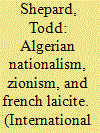

|
|
|
|
|
| Publication |
2013.
|
| Summary/Abstract |
The Algerian war resituated the meaning of "Muslims" and "Jews" in France in relation to religion and "origins" and this process reshaped French secular nationhood, with Algerian independence in mid-1962 crystallizing a complex and shifting debate that took shape in the interwar period and blossomed between 1945 and 1962. In its failed efforts to keep all Algerians French, the French government responded to both Algerian nationalism and, as is less known, Zionism, and did so with policies that took seriously, rather than rejected, the so-called ethnoreligious arguments that they embraced-and that, according to existing scholarship, have always been anathema to French laïcité. Most scholars on France continue to presume that its history is national or wholly "European." Yet paying attention to this transnational confrontation, driven by claims from Algeria and Israel, emphasizes the crucial roles of North African and Mediterranean developments in the making of contemporary France.
|
|
|
|
|
|
|
|
|
|
|
|
|
|
|
|
| 4 |
ID:
187445
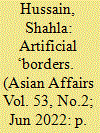

|
|
|
|
|
| Summary/Abstract |
This article focuses on the contested region of Kashmir and investigates how the nation-building project that accompanied the partition of the South Asian subcontinent, along with the creation of the ceasefire line that divided the former princely state of Jammu and Kashmir between India and Pakistan, shaped the question of belonging for the majority of its Muslim inhabitants, especially from the 1940s to the 1960s. It reveals the bureaucratic procedures put in place by the new nation-states, both driven by the question of self-determination pending in the United Nations and devoid of human considerations, made Kashmiris apprehensive about the motivations of both states. The article argues that Kashmiri belonging after partition did not seamlessly merge into the national identities of India or Pakistan. Instead, the anxieties of partition and structural challenges created by the arbitrary ceasefire line shaped Kashmir Muslim perceptions. Drawing from intercepted letters, pamphlets, and biographies, this article reveals the irrelevance of such artificial ‘borders’ in the Kashmiri psyche. In the process, it asserts that the Kashmiri demand for self-determination became intertwined with the desire for the reunification of the old princely state that would promote human-to-human contact, reopen old trade routes, and promote economic self-sufficiency.
|
|
|
|
|
|
|
|
|
|
|
|
|
|
|
|
| 5 |
ID:
027053
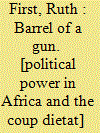

|
|
|
|
|
| Publication |
London, AllentLane Penguin Press, 1970.
|
| Description |
xiii, 513p.hbk
|
| Standard Number |
0713901632
|
|
|
|
|
|
|
|
|
|
|
|
Copies: C:1/I:0,R:0,Q:0
Circulation
| Accession# | Call# | Current Location | Status | Policy | Location |
| 005783 | 960/FIR 005783 | Main | On Shelf | General | |
|
|
|
|
| 6 |
ID:
049243
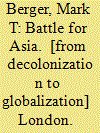

|
|
|
|
|
| Publication |
London, routledgeCurzon, 2004.
|
| Description |
xii, 343p.hbk
|
| Series |
Asia's Transformations
|
| Standard Number |
0415325293
|
|
|
|
|
|
|
|
|
|
|
|
Copies: C:1/I:0,R:0,Q:0
Circulation
| Accession# | Call# | Current Location | Status | Policy | Location |
| 047240 | 950/BER 047240 | Main | On Shelf | General | |
|
|
|
|
| 7 |
ID:
158949
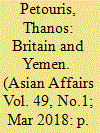

|
|
|
|
|
| Summary/Abstract |
This article publishes for the first time selections of the private correspondence (placing them in their historical context) of John G. T. Shipman (1939–2016), who took up his position as assistant adviser in the Eastern Aden Protectorate at the end of 1962 just as the first signs of political and social change were appearing in South Arabia. He served from this position in different parts of the Eastern Aden Protectorate until 1967. Shipman's correspondence allows for an unmediated appreciation of how people on the ground experienced the historical events at the time, including the British withdrawal in 1967, and highlights the extent of their own grasp of the goings-on when contrasted with the historical record. In this sense, the scope of this article is to allow the voice of one of the many British colonial officials to directly narrate their encounters during the last five years of British colonial rule over southern Arabia. The perceptive eye of a young political officer coupled with the ephemeral character of his handwritten correspondence, which providentially survived for more than five decades although it was never intended for publication, offers a fresh insight into the political and social life of the Eastern Aden Protectorate.
|
|
|
|
|
|
|
|
|
|
|
|
|
|
|
|
| 8 |
ID:
119053
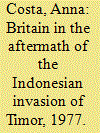

|
|
|
|
|
| Publication |
2013.
|
| Summary/Abstract |
This article fills a gap in the literature of international involvement in the aftermath of the Indonesian invasion of Timor-Leste by providing detailed documentary analysis of British conduct and motives. A substantial amount of scholarship has covered the role played by the United States and Australia during and after the Indonesian invasion of 1975. The lack of scholarly work specific to the role played by Britain during the first years of the Indonesian-Timorese conflict is regrettable as it represents a missing piece in the mosaic of international liability for one of the major massacres committed in the twentieth century. This omission has allowed the official British government version to survive, in which the country plays the role of an honest but ultimately unsuccessful broker working for a diplomatic solution between Indonesia and Portugal that would ensure the right to self-determination for Timor. The existing literature only offers a cursory challenge to this idea of British neutrality.
|
|
|
|
|
|
|
|
|
|
|
|
|
|
|
|
| 9 |
ID:
049639
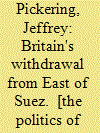

|
|
|
|
|
| Publication |
Hampshire, macmillan Press, 1998.
|
| Description |
xi, 231p.
|
| Series |
Contemporary history in context
|
| Standard Number |
0333695267
|
|
|
|
|
|
|
|
|
|
|
|
Copies: C:1/I:0,R:0,Q:0
Circulation
| Accession# | Call# | Current Location | Status | Policy | Location |
| 043112 | 327.4105/PIC 043112 | Main | On Shelf | General | |
|
|
|
|
| 10 |
ID:
121186
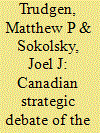

|
|
|
| 11 |
ID:
084256
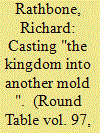

|
|
|
|
|
| Publication |
2008.
|
| Summary/Abstract |
The pomp and partying of Ghana's Independence Day in March 1957 obscured some messy politics. The triumphalist story, widely accepted outside Ghana, of a heroic Nkrumah and the Convention Peoples' Party eclipsed alternative stories from the North, the rural areas and those who opposed Nkrumah. This article also considers the ironies and iconography of Ghana's 50th anniversary celebrations.
|
|
|
|
|
|
|
|
|
|
|
|
|
|
|
|
| 12 |
ID:
172446
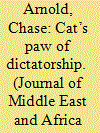

|
|
|
|
|
| Summary/Abstract |
In 1948, British authorities in the Gold Coast implemented a series of security reforms aimed at resisting future disruptions resulting from growing discontent with colonial rule. These reforms included the formation of a police intelligence organization, developed in collaboration with the British Security Service. This expansion of the colonial state into intelligence work preceded its first steps toward self-rule, inadvertently making this intelligence program an unintended participant in the process of decolonization. This article examines the foundations of that intelligence network and how it resisted the political exigencies required by the Gold Coast’s entry into diarchy. It explains how British officials arrived at the conclusion that a West African colony required a modern, intelligence-gathering apparatus under the oversight of the British Security Service and how that security system was used to challenge the realization of an independent Ghanaian state under the leadership of Kwame Nkrumah.
|
|
|
|
|
|
|
|
|
|
|
|
|
|
|
|
| 13 |
ID:
171026
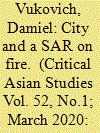

|
|
|
|
|
| Summary/Abstract |
The 2019 protests in Hong Kong have been a watershed moment for the city, both politically and socially. These protests have, for some residents, transformed the police–society relationship into one of open antagonism, fully exposed people’s fear and loathing of the mainland and their local government, and divided some families and large segments of society. These events have also caused an ordinarily quiet and civil society to become violent, enraged (at the police and government), openly racist/xenophobic, and emotionally traumatized. And yet it is highly unlikely that the outcome will be the direct nomination and election of the city’s chief executive, let alone either de facto independence or full autonomy from the mainland. But this reality will not stop demands by the pan-democrats and other opposition members directly involved in this protest movement. This is becoming a chronic, painful condition of stasis for Hong Kong as a political entity and society. There has to be compromise and yet none is forthcoming.
|
|
|
|
|
|
|
|
|
|
|
|
|
|
|
|
| 14 |
ID:
172799
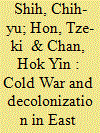

|
|
|
|
|
| Summary/Abstract |
This special issue contributes to the study of decolonization and the Cold War by tackling their interactions and framing them into comparable topics. Collectively, we explore how decolonization has proceeded during the Cold War—discovering the impacts of the Cold War, tracing the agency at post-colonial sites for adaptation under the impacts of the Cold War, and acknowledging the uneven consequences the Cold War engendered for decolonization. Theoretically, decolonization in East Asia takes place in three different spheres of relations—international, interethnic, and subaltern. 1) International relations: This sphere involves complex role relations between former colonies as security allies, economic entities, colonial rivals, historical neighbors, and cultural acquaintances. 2) Interethnic relations: This sphere attends to mutual respect and equality between territorially internal groups that have been divided since colonial times. 3) Subaltern relations: The third sphere involves the peculiar relations wherein former colonies find inspiration from each other or support one another to attain political and economic autonomy. In terms of theoretical approaches, the authors adopt historical, discursive, narrative, political economics, postcolonial, and international relations perspectives.
|
|
|
|
|
|
|
|
|
|
|
|
|
|
|
|
| 15 |
ID:
033136
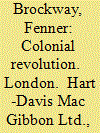

|
|
|
|
|
| Publication |
London, Hart-Davis Mac Gibbon Ltd., 1973.
|
| Description |
654p.Hbk
|
| Standard Number |
0246106050
|
|
|
|
|
|
|
|
|
|
|
|
Copies: C:1/I:0,R:0,Q:0
Circulation
| Accession# | Call# | Current Location | Status | Policy | Location |
| 012857 | 909.8/BRO 012857 | Main | On Shelf | General | |
|
|
|
|
| 16 |
ID:
121152
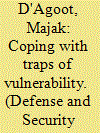

|
|
|
|
|
| Publication |
2013.
|
| Summary/Abstract |
In a world virtually free of slavery and colonialism and one mainly driven by the sovereign state rationale, allusion to manifestations or the existence of some form of these phenomena within a state is often received with dumbfounding indifference or denial. However, a form of rule that had continued in South Sudan long after the departure of the British in 1956 was colonial both in its quintessence and flair in that it disenfranchised its citizens and denied them the most basic freedoms, services and development. Under this establishment, resistance against the coercive vision of the state was brutally suppressed for many decades. This state of affairs finally ended in July 2011. Nonetheless, there is a miscellany of unresolved post-colonial issues between the two countries that warrant attention. These include security and the demarcation of borders, the issue of ludicrous transit fees for South Sudan's oil exportation through Sudan, citizenship, external debt repayment, etc. These issues are part of traps inherited from the anti-colonial struggle, which have now supplanted the old ensemble of North-South conflict paroxysm. As a matter of urgency, the two countries will have to wrap up the incomplete process of negotiation on these substantive issues. The talks should be approached with a new mindset based on the new reality of two sovereign states. To the extent that it is widely established that South Sudan and Sudan must coexist peacefully in order to develop into viable entities, such mutual dependency must be based on equality and respect.
|
|
|
|
|
|
|
|
|
|
|
|
|
|
|
|
| 17 |
ID:
111222


|
|
|
|
|
| Publication |
2012.
|
| Summary/Abstract |
In the early 1970s, Portugal still held on to the oldest European colonial empire, resisting the winds of decolonization in Africa. In this period, the Portuguese were fighting counterinsurgency campaigns in three of its overseas territories: Angola, since 1961; Guinea, since 1963; and Mozambique, since 1964. This article focuses on the counterinsurgency campaign in Mozambique because it was there, in 1972, that the most serious known atrocity took place, at least in terms of its international impact, from these unconventional wars. The appointment of a new commander-in-chief, Kaúlza de Arriaga (1970-73), to Mozambique intensified the war. Larger airborne search and destroy operations were carried out in an attempt to win the campaign quickly and decisively. It was in this context that the killing of civilians took place somewhere around the town of Tete in December 1972, which was eventually followed by an international outcry in response to its public denunciation by Catholic missionaries. The exact location, even the existence of Wiriyamu, as well as the extent of the atrocities, remain contentious. This article will use multiple sources to clarify as far as possible: what happened, why it happened, and its implications for the dynamics of counterinsurgency and intra-state wars generically. Furthermore, it will address specifically what it meant for the Portuguese way in counterinsurgency, until the rapid end of multiple campaigns as a result of a military coup in April 1974, in which Mozambique and the stain of Wiriyamu loomed large.
|
|
|
|
|
|
|
|
|
|
|
|
|
|
|
|
| 18 |
ID:
161104
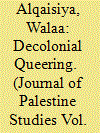

|
|
|
|
|
| Summary/Abstract |
This article analyzes the work of Palestine's most established queer rights organization, alQaws for Sexual and Gender Diversity in Palestinian Society, to reveal the political power of being queer in Palestine. It argues that an open, feminist, queer space such as alQaws is a productive site to think and practice decolonization. Relying on the author's direct involvement with the group, the article traces the development of queer Palestinian thought to provide a critique of queer politics in Palestine: it recounts how since the establishment of the organization in 2001, alQaws activists have increasingly transcended exclusivist gay identifications and rejected singling out sexuality as a discrete site of oppression disconnected from Zionist settler colonialism. The discussion covers Israeli pinkwashing and its counter, Palestinian pinkwatching; it deconstructs pinkwashing narratives, rejects the myth of the colonial savior, and reveals how discourses of sexual progress reproduce Zionist colonialism. It also documents alQaws's challenge to normalizing development discourse.
|
|
|
|
|
|
|
|
|
|
|
|
|
|
|
|
| 19 |
ID:
049897
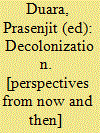

|
|
|
|
|
| Publication |
London, Routledge, 2004.
|
| Description |
xvi, 312p.
|
| Series |
Rewriting histories
|
| Standard Number |
0415248418
|
|
|
|
|
|
|
|
|
|
|
|
Copies: C:1/I:0,R:0,Q:0
Circulation
| Accession# | Call# | Current Location | Status | Policy | Location |
| 047353 | 325.3/Dua 047353 | Main | On Shelf | General | |
|
|
|
|
| 20 |
ID:
053186
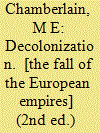

|
|
|
|
|
| Edition |
2nd ed.
|
| Publication |
Oxrford, Blackwell Publishers, 1999.
|
| Description |
xvi, 140p.Hbk
|
| Series |
Historical Association Studies
|
| Standard Number |
0631218041
|
|
|
|
|
|
|
|
|
|
|
|
Copies: C:1/I:0,R:0,Q:0
Circulation
| Accession# | Call# | Current Location | Status | Policy | Location |
| 042557 | 940/CHA 042557 | Main | On Shelf | General | |
|
|
|
|
|
|
|
|
|